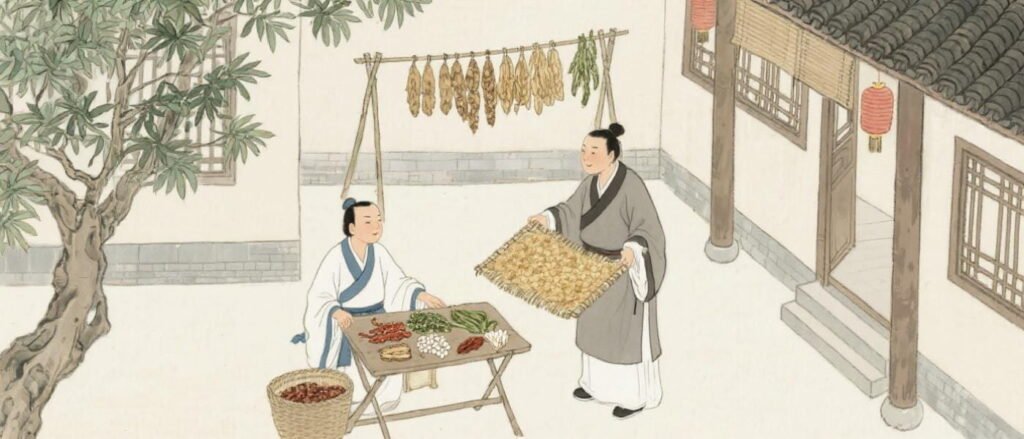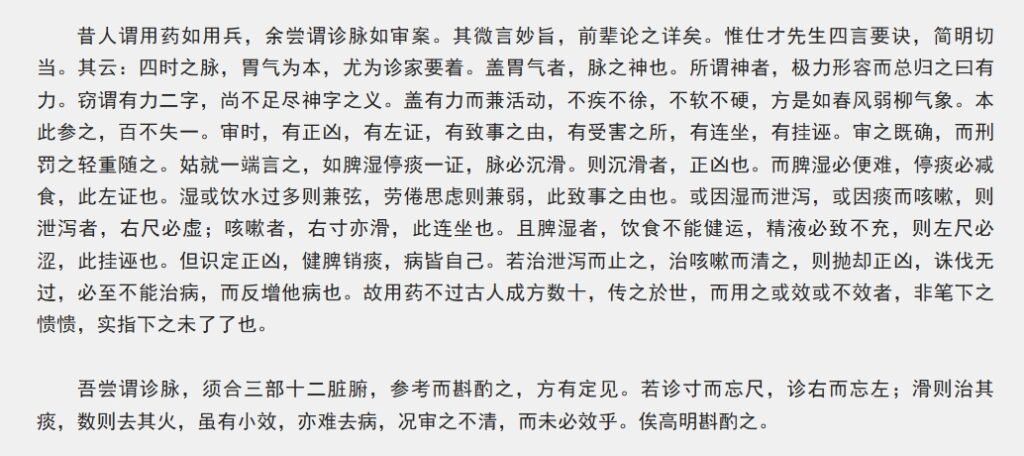The ancients said, “Applying herbal medicine is akin to military strategy,” while I propose that “diagnosing pulses resembles investigating a legal case.” Though predecessors have thoroughly explored these profound principles, I particularly endorse Mr. Shicai’s Four-Character Guideline for its clarity and practicality. His teaching states: “Across seasonal pulse manifestations, stomach qi (weiqi) serves as the foundation,” emphasizing the critical role of stomach qi in pulse diagnosis.
Stomach qi represents the vitality of the pulse. While many describe this vitality as “strong and forceful,” I find this incomplete. A truly healthy pulse should be: moderately powerful, rhythmically fluid, neither too rapid nor too slow—like willow branches swaying gently in a spring breeze. Mastering this essence ensures accurate pulse interpretation.

Just as detectives distinguish between primary culprits, witnesses, motives, crime scenes, accomplices, and innocent bystanders, pulse diagnosis requires holistic analysis. Consider the example of spleen dampness with phlegm retention (pi shi ting tan):
- Deep and slippery pulse (chen hua mai) is the root cause (primary culprit)
- Constipation (from spleen dampness) and reduced appetite (from phlegm stagnation) are accompanying symptoms (witnesses)
- If dampness arises from excessive water intake, the pulse may feel taut like a plucked string (wiry pulse, xuan mai); if from overexertion, the pulse weakens (weak pulse, ruo mai)—these reveal the etiology (motives)
- Complications like diarrhea correlate with a feeble right Chi pulse (corresponding to the large intestine); coughing aligns with a slippery right Cun pulse (lung region)—these reflect organ interconnections (accomplices)
- Spleen dampness also impairs nutrient absorption, causing stagnation in the left Chi pulse (kidney yin)—a secondary effect (innocent bystander)
Focusing solely on the slippery pulse’s root cause and addressing it through fortifying the spleen (jianpi) and dissolving phlegm (xiao tan) leads to recovery. Merely stopping diarrhea or suppressing coughs would be like punishing the innocent—ineffective and potentially harmful.
Classic herbal formulas passed down through generations remain limited in number. Their efficacy hinges on precise pulse interpretation—a skilled prescriber may fail not due to flawed formulas, but from misreading the body’s signals.
My recommendation: Analyze pulses by integrating observations from three positions (Cun, Guan, Chi) corresponding to twelve organ systems. Isolating the Cun (wrist-top pulse) while ignoring the Chi (wrist-base pulse), or prioritizing the right wrist over the left, leads to partial understanding. For instance, treating phlegm (slippery pulse, hua mai) or heat (rapid pulse, shu mai) in isolation might temporarily relieve symptoms but rarely cures. Misjudgment risks worsening conditions. May practitioners reflect deeply on this wisdom.

(Key terms explained:
- Cun, Guan, Chi (three pulse positions on the wrist): Correspond to heart/lungs (Cun), liver/gallbladder (Guan), and kidneys (Chi)
- Twelve organ systems: Includes five zang organs (heart, liver, spleen, lungs, kidneys), six fu organs (gallbladder, stomach, small/large intestine, bladder, sanjiao), and pericardium)*


Leave a Reply